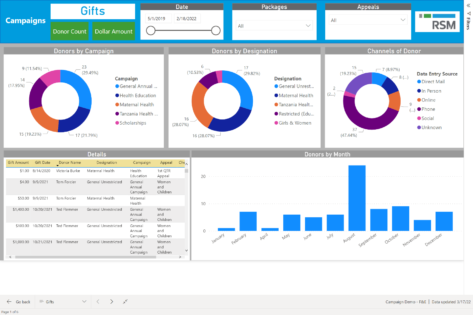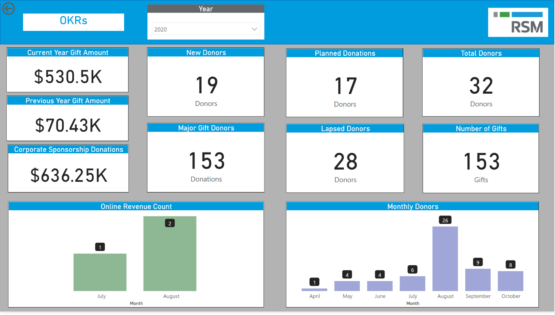Non-profits keeping up with the increased need for analytics to address member engagement, member retention, and more…
Using data effectively and proactively to make business decisions is a key to successful organizations, but unfortunately, this is often challenging for not-for-profit organizations. Treating data like an asset means managing, fixing, and maintaining content to ensure it’s ready and reliable to support business activities. Still, not many reporting technologies are geared toward the not-for-profit industry or provide out-of-the-box reports that satisfy all requirements.
Some customers export raw data manually into spreadsheets and create reports and analytics within Excel. While this approach works in the short term and provides some basic capabilities, it is a manual process; it is not scalable and creates silos of information. The information is also stale as soon as the export takes place.
In addition to not providing a 360-degree view of the business, spreadsheets do not allow for easy collaboration among multiple users because they require emailing or manual sharing of findings and insights. As a result, the results include numerous versions of documents, often with different conclusions.

How to use data as a strategic asset to generate more actionable insights
To address the challenges described, RSM has built the Microsoft Dynamics 365 Customer Engagement Sales Accelerator, leveraging the Nonprofit Common Data Model as the foundation for the data layer of the Accelerator. The Common Data Model is the data layer for the Microsoft Cloud for Nonprofit. This Accelerator works on day one with Fundraising and Engagement (F&E) and Volunteer Management.
Because of the Common Data Model usage, the data is in real-time using Power BI to enhance the user’s experience. With complete filtering and drill-down capabilities, the 6 Power BI report screens are built to aid users in gathering more insight into their organizations’ data.
These dashboards can reside natively in Dynamics 365, providing the users a seamless experience from inside the application and quick, easy implementation. Reports are tested and designed to be delivered to end users in a short time frame. With the ability to have the report ready in about 3 weeks, these industry-standard dashboards get analytics into the hands of the decision-makers faster. In addition, data is regularly refreshed on a schedule to meet organizational needs and requires little maintenance.
Transforming how your organization handles data is crucial to its growth and success. It provides new and more meaningful ways to improve your business process and grow your impact on the communities and people you serve.
If your organization is seeking additional reporting, stay tuned for the second post of the NFP Accelerator series. We will take a closer look at the additional reports in this accelerator package that allows quick insights into grant tracking and member analytics.
Please contact the RSM Dynamics or BI team if you have further questions or are looking for additional guidance or resources.

 RSMUS.com
RSMUS.com